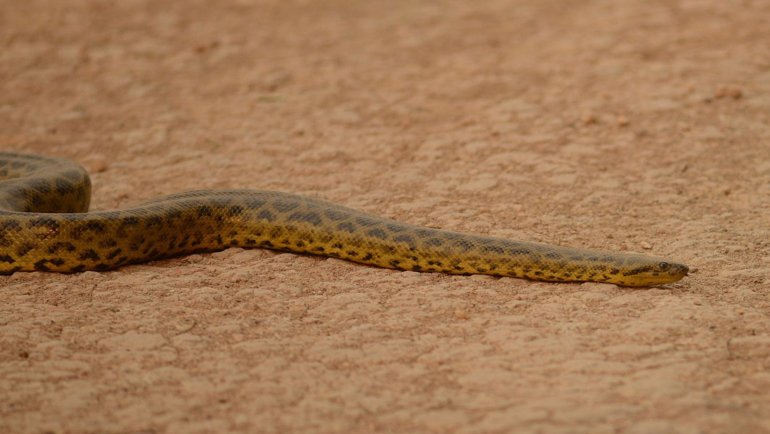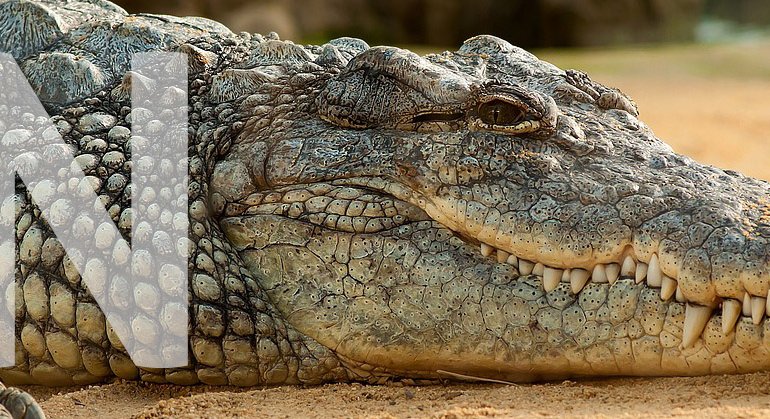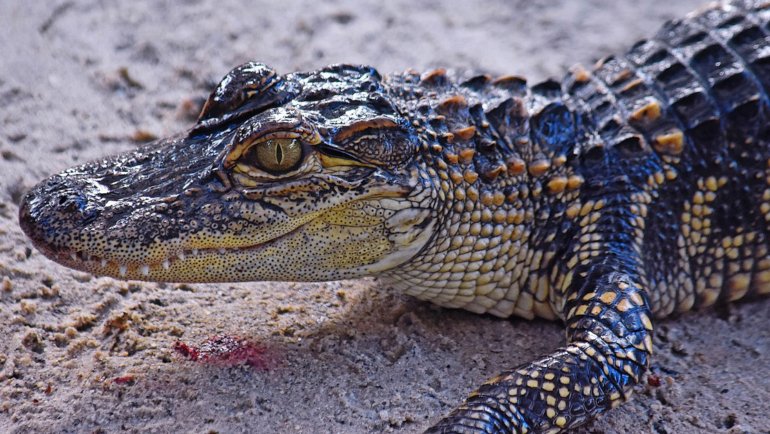Alligators, the iconic reptiles of the American Southeast, are often subjects of fascination and intrigue. Part of this curiosity stems from their remarkable adaptability and resilience. Among the frequently asked questions about these creatures is: How long can an alligator survive without eating? To truly understand this, we must first delve into the diet and metabolism of the alligator.
What Do Alligators Eat?
A Carnivorous Diet: Alligators are primarily carnivores. Their diet can range from fish, birds, and turtles to various mammals like raccoons or deer. As apex predators, they play a crucial role in maintaining the balance of their ecosystem.
Juveniles vs. Adults: Younger alligators, or “hatchlings,” have a diet that primarily consists of smaller prey like insects, amphibians, and small fish. As they grow, their diet evolves to include larger animals. Adult alligators, with their powerful jaws, are capable of taking down sizeable prey, but they’re also opportunistic, meaning they’ll eat what’s easily available.
Location-Based Diet Variance: The diet of an alligator can vary depending on its habitat. Alligators in marshy areas might eat more fish, while those in swampy regions might consume more mammals and birds. They are versatile predators, adapting their diet based on what the environment offers.
Here is a list of common alligator prey:
- Fish: A staple in the alligator diet, including catfish, gar, and bass.
- Birds: Such as wading birds, ducks, and occasionally larger birds like herons.
- Turtles: Both freshwater and terrestrial species.
- Amphibians: Frogs and salamanders are especially common for younger alligators.
- Insects: Primarily consumed by hatchlings.
- Small mammals: This includes animals like raccoons, opossums, and muskrats.
- Larger mammals: Occasionally, adult alligators might prey on deer, wild hogs, or even smaller alligators.
- Crustaceans: Such as crayfish, particularly in marshy habitats.
- Reptiles: Including snakes and smaller lizards.
- Carrion: Alligators will often scavenge and eat dead animals they come across.
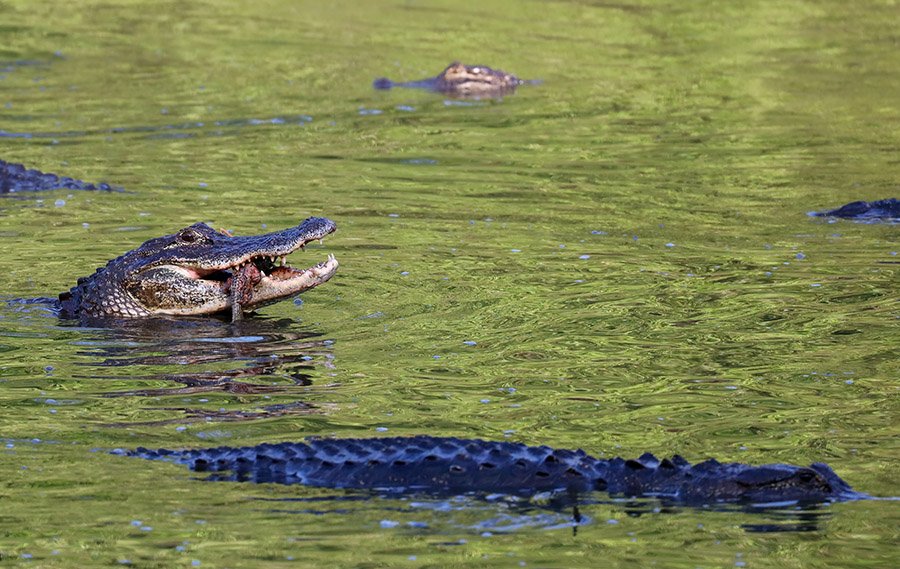
Factors Affecting Alligator Feeding Frequency
The dietary habits of alligators are influenced by various factors. While it might seem like these reptiles are always on the prowl, ready to snap up anything that comes their way, the reality is a bit more complex.
The Role of Temperature in Alligator’s Eating Habits: Alligators, like all reptiles, are ectothermic, meaning their internal body temperature is regulated by the external environment. In warmer temperatures, an alligator’s metabolism speeds up, and they may eat more frequently. Conversely, in cooler temperatures, their metabolism slows, which can decrease their need for food.
Age and Size Considerations: Younger alligators, still in their growth phase, need consistent nourishment and therefore eat more frequently. Smaller prey such as insects, small fish, and frogs often make up their diet.
As they grow, the frequency of their meals might decrease, but the size of their prey and the amount they consume in one sitting increases. Adult alligators can go for longer periods without eating due to their larger energy reserves.
Seasonal Changes and Their Impact: Seasonal changes can influence the availability of prey. During certain times of the year, especially in the colder months, alligators enter a state of brumation — a period of dormancy similar to hibernation.
During this time, they eat very little or nothing at all. The wet and dry seasons can also affect the availability of water-based prey, influencing the alligator’s diet and feeding frequency.
Availability of Prey: Alligators are opportunistic feeders. If there’s an abundance of food in their habitat, they’ll eat more frequently. However, during times of scarcity, they can rely on their stored fat reserves and slow their metabolism to conserve energy.
Environmental Stressors: Factors such as pollution, habitat destruction, or human interference can impact the alligator’s feeding patterns. When their natural habitat is disturbed, it can lead to a decrease in prey availability, forcing alligators to fast or seek alternative food sources.
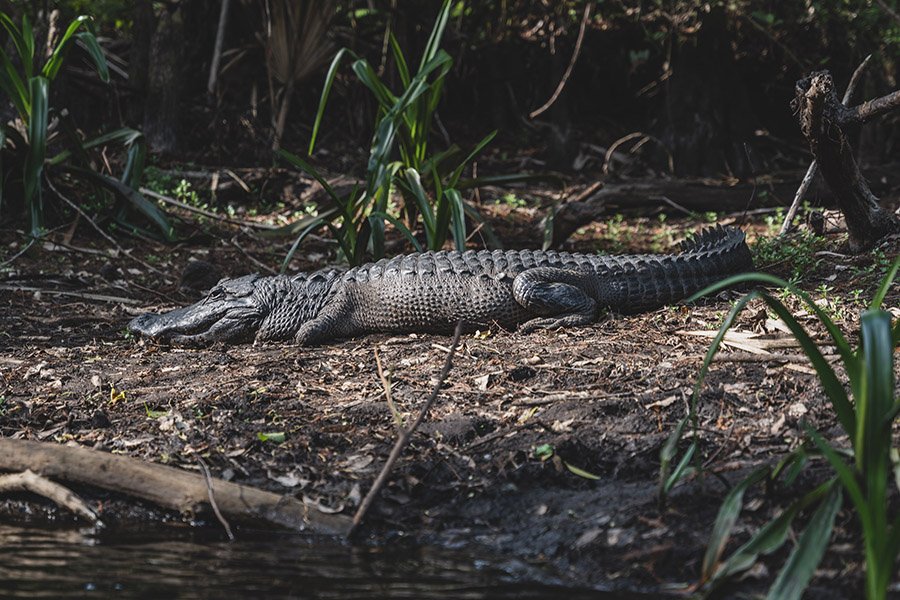
How Long Can an Alligator Go Without Food?
Alligators, as part of the reptile family, possess a unique capability that never ceases to amaze biologists: their ability to go extended periods without food. The question of how long they can go without eating might be met with a range of answers based on factors like the alligator’s age, health, and environmental conditions.
However, in general terms, this is not just a matter of days or weeks. An adult alligator can go for several months without a meal. Such a fasting ability is particularly pronounced in adult alligators.
There have been documented instances of alligators surviving without food for up to a year, especially during colder months when their metabolic rate drops drastically.
Physiological adaptations
Alligators, like many reptiles, have evolved with a slow metabolic rate. This means they don’t require as much energy as warm-blooded animals and thus don’t need to eat as often.
Their body is adept at utilizing stored energy efficiently. During times of fasting, their metabolic rate can further decrease, allowing them to conserve even more energy.
Fat Storage and Energy Conservation
Fat storage plays a pivotal role in the alligator’s fasting capability. When an alligator consumes food, it stores excess energy as fat, primarily in their tails. This stored fat can then be utilized during lean times. Moreover, alligators are strategic in their energy use.
During fasting periods, they minimize unnecessary movements, basking in the sun to regulate their temperature instead of expending energy to produce warmth.
Why Would an Alligator Not Eat?
There are several reasons an alligator might not eat, ranging from natural environmental changes to potential health problems.
Environmental factors leading to food scarcity: Alligators are opportunistic feeders, which means they eat what’s available. In times of drought or during colder seasons when many fish and mammals become scarce or less active, alligators might find less prey. Floods can also disrupt their feeding patterns by dispersing their prey.
Health issues or injuries: Just like any other animal, alligators can fall sick or get injured. When they do, their appetite can diminish. An injured alligator, especially one with a damaged mouth or jaw, might find it challenging to hunt, leading to prolonged periods without food.
Seasonal Brumation: Brumation is a reptilian response to colder weather, quite similar to hibernation in mammals. During this period, alligators become less active, retreating to the safety of burrows or lying dormant at the bottom of water bodies.
Their metabolic rate drops, and their need for food diminishes. In colder regions, this dormancy can last for months, during which the alligator will not eat. It’s a survival strategy, allowing the reptile to endure conditions that aren’t conducive to hunting or feeding.
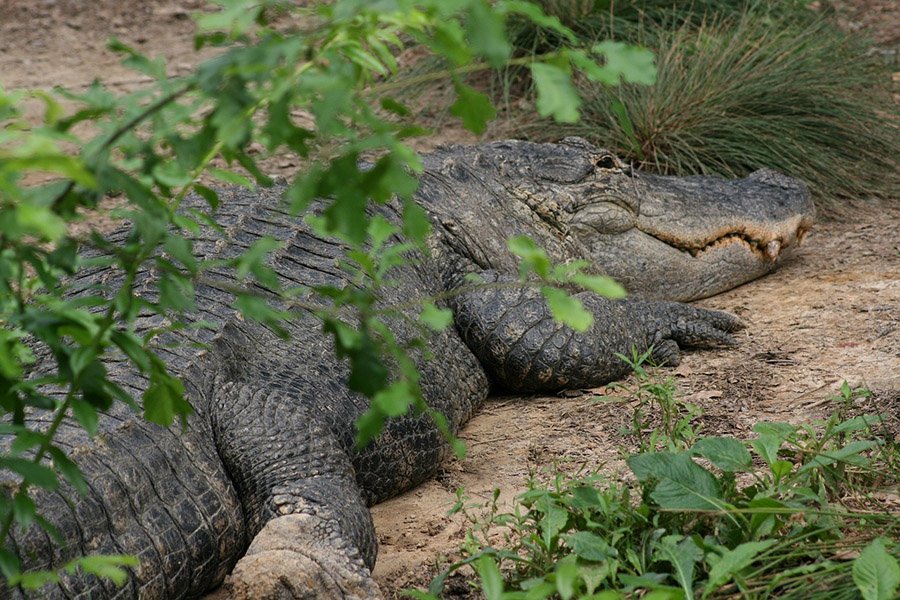
Potential Risks of Extended Fasting
While alligators have evolved to cope with periods of food scarcity, this doesn’t mean extended fasting comes without potential risks. These creatures, like all living beings, have certain physiological needs, and prolonged periods without food can lead to several complications.
Health Implications: The first and foremost concern is a decline in overall health. While adults have a substantial fat reserve to rely on, they can’t sustain indefinitely without nutrition. Over time, a lack of essential nutrients can weaken their immune system, making them susceptible to diseases.
Effects on Growth in Younger Alligators: Juvenile alligators don’t have the same fat reserves as their adult counterparts. They are in a phase of rapid growth and require consistent nutrition to support their development.
Extended fasting can stunt their growth, leading to undersized adults. A lack of adequate food during these formative years can also lead to weaker bones and a compromised immune system, affecting their survival rates.
Increased Aggression and Behavioral Changes: Alligators, when starved, can exhibit changes in behavior. Their natural survival instincts kick in, making them more aggressive in their hunt for food.
This increased aggression can pose a threat not only to their usual prey but also to other animals or even humans that might come into their territory. Furthermore, prolonged starvation can lead to desperation, causing alligators to venture into areas they usually avoid, like populated regions or roads.
Frequently Asked Questions
How do alligators survive the winter months when food is scarce?
During the colder winter months, alligators enter a state of brumation, slowing down their metabolism and reducing their activity levels. They often retreat to burrows or remain submerged at the bottom of water bodies. This lowered metabolic rate reduces their need for food, allowing them to survive on their stored fat reserves.
Do alligators ever intentionally fast, like some animals do before shedding?
Alligators don’t intentionally fast in preparation for shedding like some reptiles might. However, they do have periods of reduced appetite due to environmental factors, such as cold temperatures.
Are there any other animals that can go as long without food as alligators?
Yes, several animals exhibit remarkable fasting abilities. Some snakes, for instance, can go months without a meal. Desert animals like camels can survive weeks without food, relying on their fat stores. Another example is the Galápagos tortoise, which can survive without eating or drinking for up to a year under the right conditions.
How do alligators find food after prolonged fasting periods?
After an extended fasting period, alligators return to their opportunistic feeding habits. They rely on their keen senses to detect prey. This could be through sensing vibrations in the water, spotting prey visually, or detecting scent.
They remain patient and strike when the opportunity presents itself, taking advantage of whatever food sources are available in their habitat.
Other Articles About Alligators
- American Alligator: Characteristics, Diet, Facts & More [Fact Sheet]
- What Eats An Alligator: Top 12 Alligator Predators
- What Do Alligators Eat? – All About Their Diet
- Are Alligators Friendly to Themselves or Even Humans?
- Caiman vs. Alligator: Distinguishing the Reptilian Relatives
- Alligators – 30 Amazing Facts, Info & Pictures
- How Fast Can an Alligator Run? Can a Human Outrun an Alligator?
- How Long Do Alligators Live? Understanding the Alligator Lifespan
- When Are Alligators Most Active? Decoding Their Mysterious Behavior
